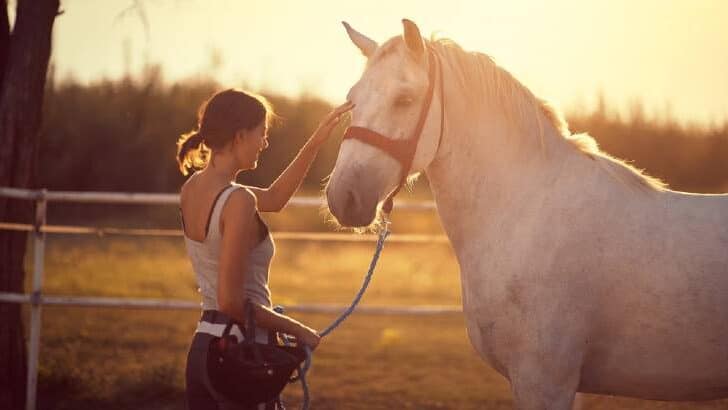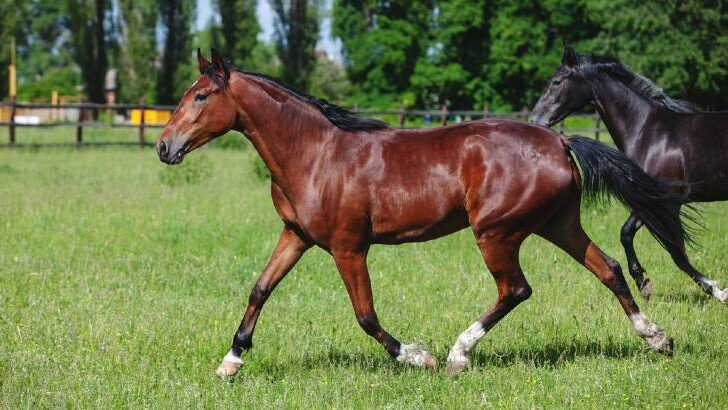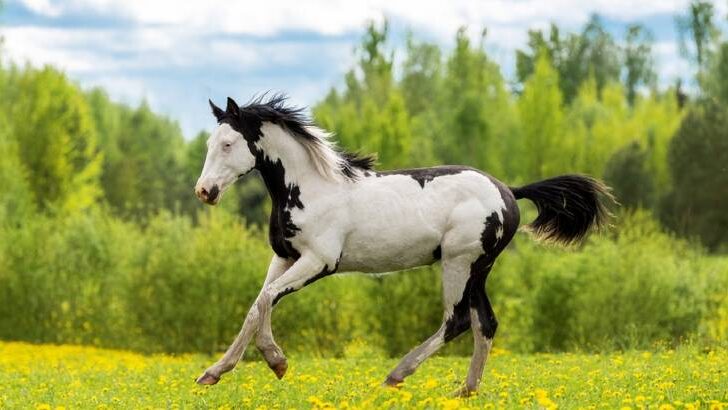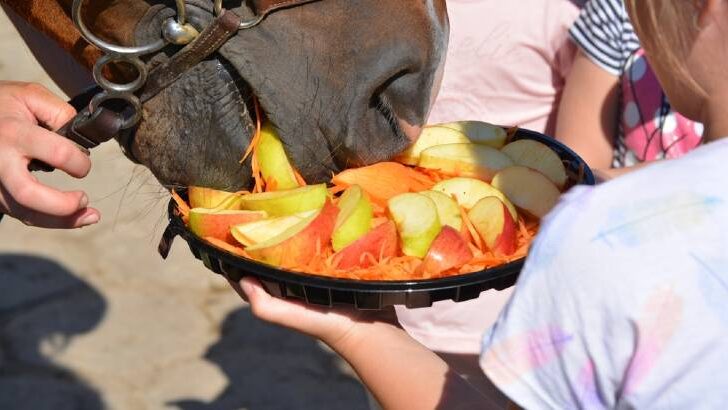Affiliate Disclaimer
As an Amazon Associate I earn from qualifying purchases. It helps me keep the website going. Thank you for your support.
Calling your horse in from the field is often a wonderful sight – they hear their name and come running to you. This is true for most horses, and it’s a sign that they like spending time with you. But do horses know their name when you call them or is it simply a cue word to them?
Horses know their name, but not in the same way that people do. Horses recognize themselves and others as individuals, but do not use names when communicating. To horses, their name is somewhat of a cue word. They associate the word with something positive, like food or affection from their owner.
Names are a human invention that we have imposed onto horses. They make our lives much easier when owning and managing different horses. While horses know their names, they don’t use names to communicate with each other. Read on to learn more about names and communicating with horses.
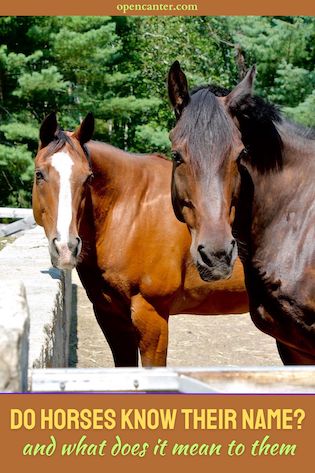
Where Did Names Come From?
Names have been used for thousands of years, right through human history. As far back as history books go, people have had names. Names became more complex over time, as larger populations meant you likely shared a name with multiple people.
For horses, names are a human invention imposed on them for convenience. Using names makes it easy for us to tell the farrier which horse needs shoeing, or which one is competing. Names were likely used because they are nicer and more memorable than numbers. The use of names for horses also shows how humans see horses as individuals and form strong bonds with them.
Do Horses Use Names to Communicate?
Horses have their own highly developed set of social skills, that do not rely on the use of names. Horses do identify themselves and other horses as individuals within a herd. Despite this, they don’t use names to address each other.
Horses predominantly use body language to communicate. The position of their ears, the way that they move, and how they look at each other are all forms of communication.
Horses do use some vocal communication, such as whinnies, snorts, or squeals. These are generally always accompanied by body language. However, horses don’t use these sounds to identify other horses by name. Instead, they use it as a way of communicating to others how they are feeling.
For example, a horse in distress might whinny repeatedly in a high-pitched tone. This indicates to other horses to be on alert as a nearby horse is feeling anxious. Squeals usually indicate aggression or excitement, and snorts can be a greeting or a show of anxiety (source).
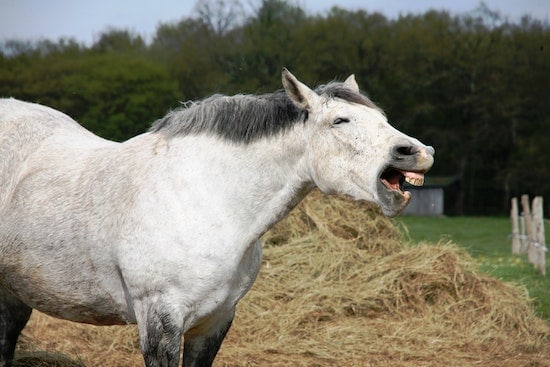
Why Do Horses Whinny to Each Other, if They Don’t Use Names?
Horses will often whinny when their herd mates leave them. This is likely an expression of separation anxiety and is often coupled with fence walking and high head posture. The whinny is likely a call to the other horse saying “I am here, where are you?”
This situation is possibly as close as we will get to horses calling each other by name. Research has shown that horses can recognize the whinny of their herd mates. The horse that has left may reply, as they have recognized the whinny of their friend. However, other horses might also whinny in response letting the anxious horse know they are near (source).
Similar things are seen at competitions. Most of the horses at the venue have never met before, yet they all whinny to each other. These horses are likely communicating with each other about how they are feeling in an unfamiliar environment. They would not know the ‘names’ of the other horses, but rather are whinnying in something of a broadcast.
Horses have established herd networks, which are part of their prey animal’s evolved behavior. When taken out of their usual situation, they rely on communicating with other horses to replicate herd mentality. Plus, the horse who is at a competition is likely more anxious than one that is in its usual environment.
Do Horses Know Their Name as a Symbol of Identity?
A name is a symbol of self – in the case of humans, most people have a name. Having a name is an important part of our identity.
To humans, names give us a sense of who we are, and a way to identify each other. Without names, it would be difficult to connect with other people.
To horses, it is unknown if they have the same sense of self as humans do. Without this, the horse is unlikely to associate a name with ‘me’, and more so understands their name as just a word.
An Italian experiment involved painting an ‘X’ on the cheeks of horses before turning them loose in an arena. In the arena was a large mirror. When the horses saw themselves in the mirror, they tried to rub the mark off their cheek (source).
This experiment indicates that when the horses saw themselves in the mirror, they identified themselves. If they did not do this, it would have been unlikely that they would have tried to rub the mark off immediately after.
Other studies show that horses can remember each other after long periods apart. They also react differently to the voices of familiar vs unfamiliar horses. Horses can also match individual humans to their voices and recognize people who used to care for them from photos (source).
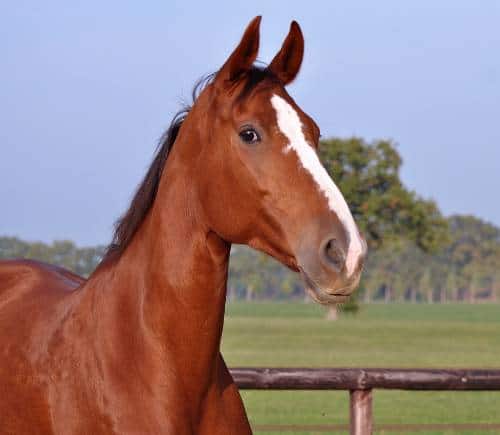
These results suggest that horses do recognize each other, and humans, as individual beings. They recognize others as individuals and therefore see themselves as individuals too.
However, the importance of having a name is likely less important to horses than it is to humans. Horses have other ways of identifying each other, based on the way that they communicate. Names for horses are more of a convenience for humans than they are an identifying factor for horses.
Do Horses Know Their Name, or Just The Word Used For Their Name?
There is no scientific research to show whether horses understand their name as the word that means ‘me’. However, it has been shown that horses can learn to respond to certain words used as cues.
Horses can be trained to understand words like ‘stand’ or ‘back’, along with words for paces like ‘trot’ or ‘canter’. The horse knows that the word means that they need to perform a particular action to receive a reward. The reward may be food or a scratch, or simply the release of pressure. You can read more about whether horses understand words here.
When it comes to names, humans don’t use them in the same way as cue words. However, it is likely that the horse knows their name as a cue.
For example, when you call your horse in from the field you are using their name as a cue word. Each time you call, the word sounds the same. The horse hears the word, recognizes the sound, and comes knowing they receive a reward.
This theory is supported by the horse that comes in from the field to a whistle, but not when their name is called. They recognize the whistle as the cue, not their name.
If Horses Know Their Names, Will Changing Their Name Confuse Them?
You can change a horse’s name, but be aware that the horse will need to learn their new name. You can teach your horse their new name, by using rewards whenever the horse responds to it. The horse will likely be confused to start with but should learn the new name quickly.
Some people say that it is bad luck to change a horse’s name. It is unknown where this theory originated from, but it is based purely on superstition.
Perhaps humans have struggled to form bonds with horses who have had their names changed. This is likely because the horse did not recognize its new name at first.
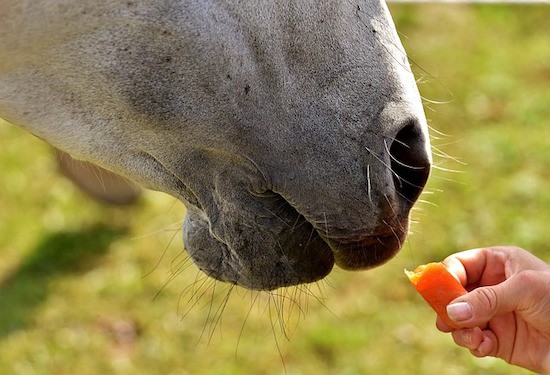
What is a ‘Barn’ or ‘Stable’ Name?
A single horse can have more than one name. A ‘barn’ or ‘stable’ name refers to the common name the horse is known by. This is often shorter than the ‘registered’ or ‘competition’ name. In some cases, the barn or stable name will be completely different from the registered name.
This is because the registered name is often too long to use in everyday situations. Horses can only recognize single, shorter words, and having a barn name is convenient for humans as well.
The registered name often incorporates things like the name of the stud the horse was born at. They can also include references to the name of the horse’s dam and sire. It helps identify breeding lines without having to reference registration paperwork. This name is used on the horse’s breed or association registration paperwork, as well as in competition.
Imagine trying to call Wallgandry Park Shooting Star in from the field! This is where the barn name comes into play. Calling the horse by the name “Star” is much easier.
Final Thoughts
While horses know their names, they only do so through training. Their name is a signal that if they come, they receive a positive reward. They do not interpret the word as a symbol of self or identifying factor like humans do. However, research has shown that horses do see themselves as individuals, and identify each other using body language rather than names.

